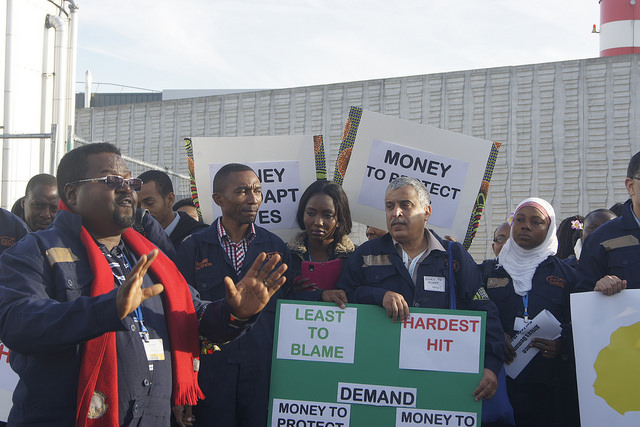
By LIVIA BIZIKOVA & FRASER REILLY-KING
The Sustainable Development Goals (SDGs) are a shared agenda for all of us. Practically, this means that there are numerous entry points in which to engage: from consultations and defining new policies and programs, to implementing specific goals, to changing cultures, behaviours and practices – all necessary to realize the transformative potential of the SDGs.
At the national level, civil society organizations (CSOs) play a crucial role in translating global agendas into national priorities, working through networks and their members. In turn, they ensure that through their supporters and the citizens that they work with, these national priorities reflect provincial, regional and local needs, grounded in people’s lived realities.
In this way, CSOs act as catalysts for critical global and national agendas, and assist in bringing citizens’ voices to national debates and the development of national strategies.
Furthermore, CSOs play a critical role working with governments in implementing their agendas, delivering services, generating research and evidence, holding governments accountable to their commitments, and advocating for change, including around the SDGs.
This article briefly reviews some of the roles, needs and emerging practices of CSOs in advancing SDG implementation.
In mid-July 2017, the High-level Political Forum on Sustainable Development of the United Nations (HLPF) concluded in New York with 43 countries presenting their voluntary national reviews (VNRs). These reports profiled progress each country has made around implementing the SDGs.
The synthesis of the VNRs developed by United Nations Economic and Social Council underscored the need for cooperation and inclusion to implement the SDGs, in particular “with civil society, local authorities, indigenous peoples, local communities, academia and all other relevant actors.” (Para 25)
More specifically, it stressed the importance of early and informed collaboration and cooperation at the national level by governments during the planning and implementation phase, “to ensure that the voices of stakeholders are adequately heard in the intergovernmental processes, for example through multi-stakeholder dialogues, hearings or through gathering inputs.” (Para 27) With a few exceptions, a common complaint among many of the civil society groups attending the HLPF was that very few governments have done this to date.
Recognizing the important roles that civil society play in delivering on the SDGs, including in mobilizing citizens and assisting with effective SDG implementation, there needs to be a well-defined space for effective engagements between governments and CSOs. So what spaces already exist or are emerging?
Different CSO networks are coming together around the SDG agenda (at both the national and regional level), with many groups focusing on efforts to pressure their governments to implement the SDGs, and to monitor progress around its implementation.
The HLPF stimulated a whole host of shadow reports (reacting to country VNRs) and spotlight reports (profiling CSO perspectives on what actually needs to happen).
Regionally, various initiatives are also emerging. The Southern Voice on Post-MDG International Development Goals (Southern Voice) serves as an open platform that contributes to the regional and global dialogue on the SDGs, building on a network of 49 think tanks from Africa, Latin America and Asia.
On the monitoring side, the International Aid Transparency Initiative (IATI) urged improved tracking of financial allocations to sustainability projects. SDG Watch Europe is a coalition of over 50 CSOs across Europe focusing primarily on holding governments accountable at the European and global levels.
Global networks are also collaborating at the local level using citizen-generated data that is capable of leveraging technology to generate real-time and context-specific data. These initiatives can complement sometimes stand-alone national-level SDG tracking processes.
What about Canada? In late June 2017, over 40 Canadian national and provincial networks gathered in Ottawa in a first “National Conversation on Canada and the SDGs”.
The group drew conclusions similar to those reached in other countries and regions – recognizing the value of a national platform that could help facilitate mutual knowledge sharing and learning, foster potential collaboration between groups that hadn’t typically interacted with one another, advocate collectively to the government around SDG implementation, and engage in multi-stakeholder dialogue with the government.
The meeting also identified other priorities for effective CSO engagement on the SDGs:
Strengthening the alignment of CSO programming at the national level with the SDGs, and building in the integration of different (but related) goals and targets across their respective programming.
Many participants already indicated that they work on most of the SDGs, and are already integrating many SDGs that go beyond their primary area of focus. This can be strengthened.
Providing additional data to track progress on SDG implementation. CSO-run, citizen-based monitoring programs collect data on progress around SDGs. In many cases, this may complement official data being collected. Many organizations noted that they can adjust their current data collection and processing methods to be more aligned to the SDG indicators reported to HLPF at the national level.
This will become crucially important when the country develops its VNR, allowing for data beyond that collected from national statistics to be included.
Creating networks to reach citizens and share tools and experiences. Most CSOs have a large constituency and membership covering the whole country and/or specific regions. Creating a strong national network (of networks) can help achieve all of the above listed tasks, but also can help raise awareness and educate citizens. CSOs’ large collective reach within the country facilitates sharing tools and materials for education,thus avoiding the duplication of efforts.
Contributions by CSOs to the SDG agenda are only going to continue to grow.
Looking ahead to next year’s HLPF, sharing best practices around CSO engagement in this agenda will help further profile and leverage the potential role and impact that CSOs are having in delivering this agenda – making their inclusion increasingly hard for governments to ignore.
Culled from SDG Knowledge Hub











